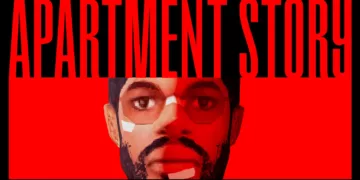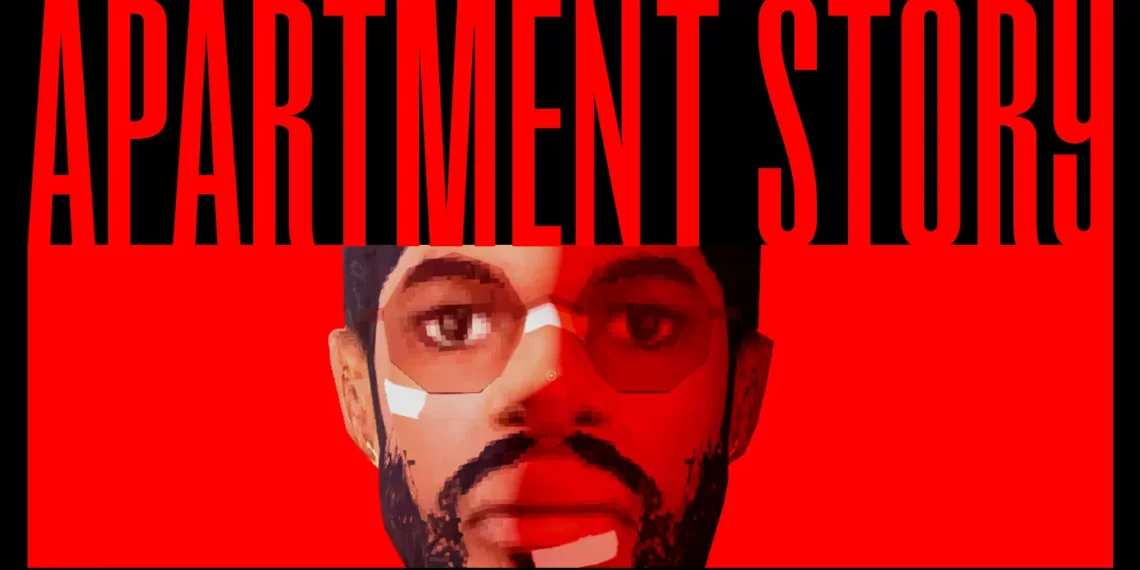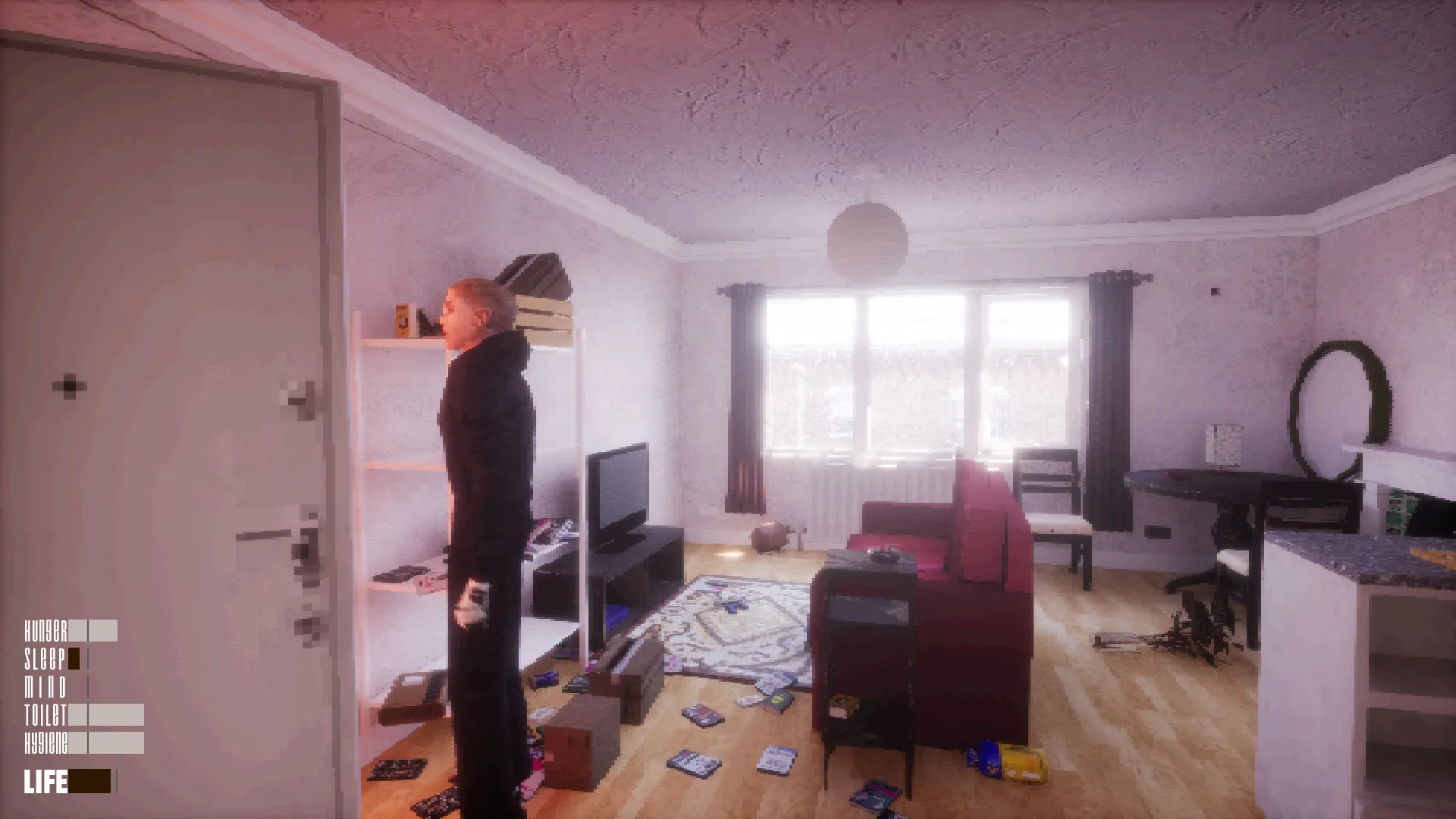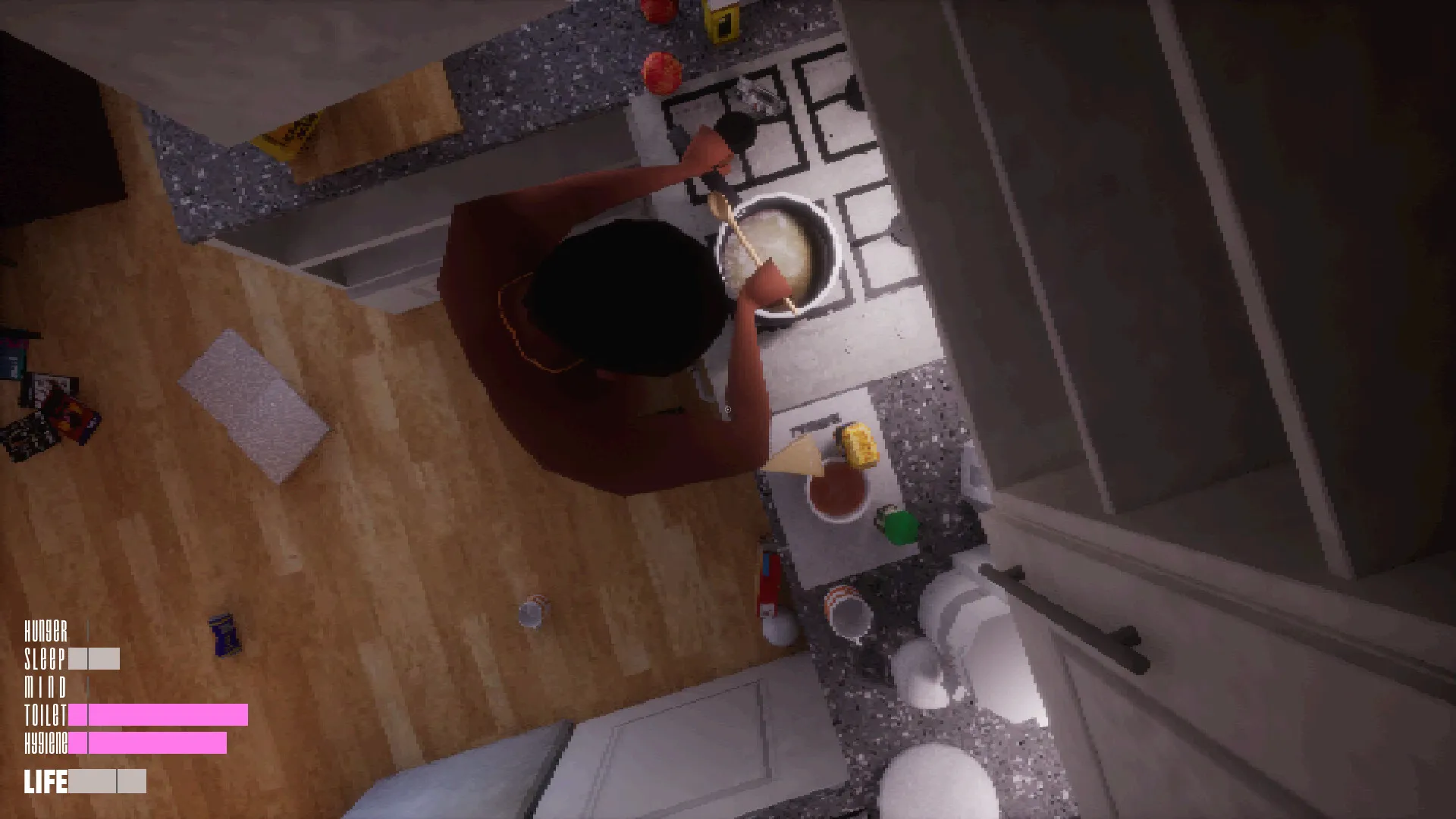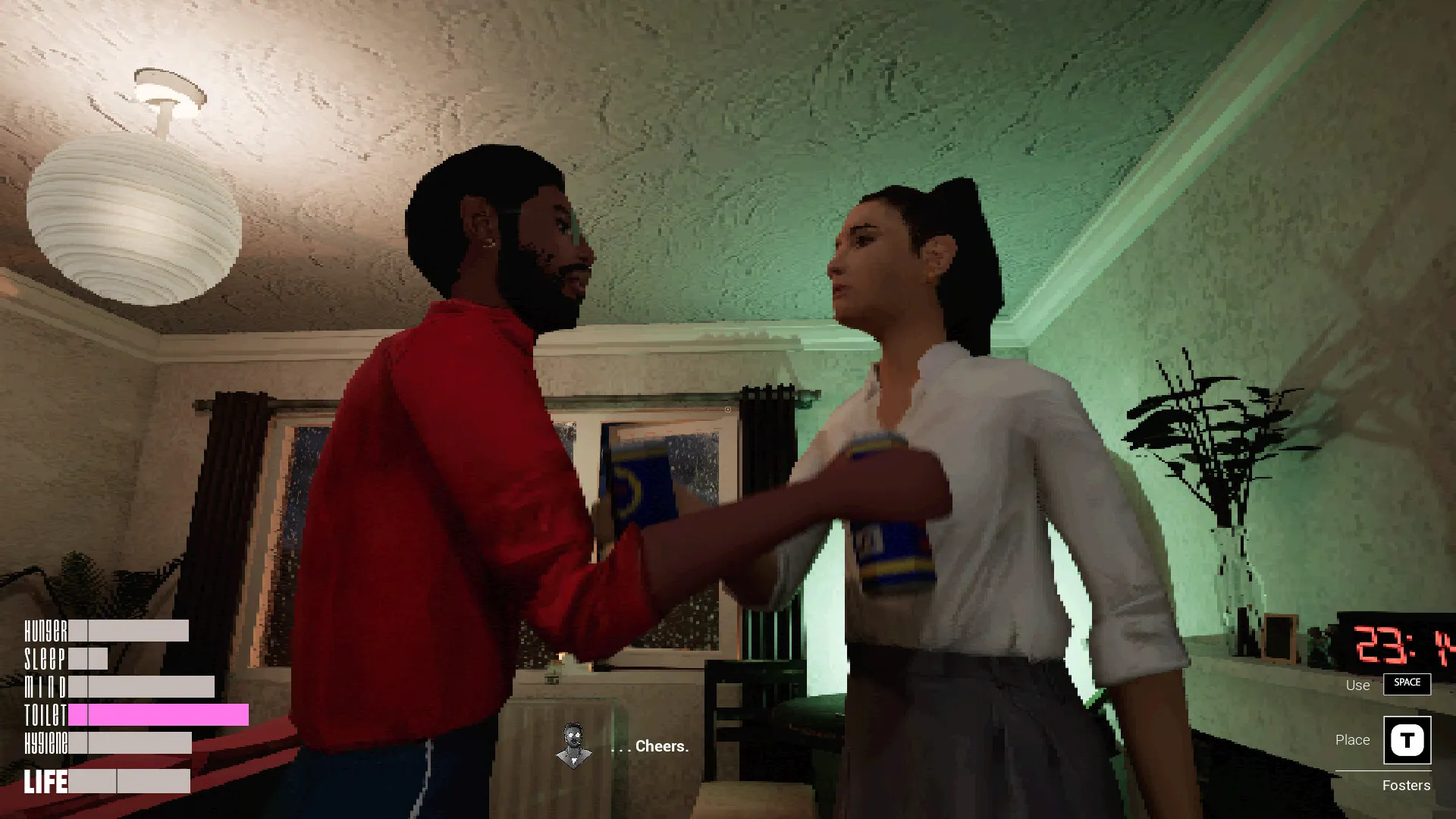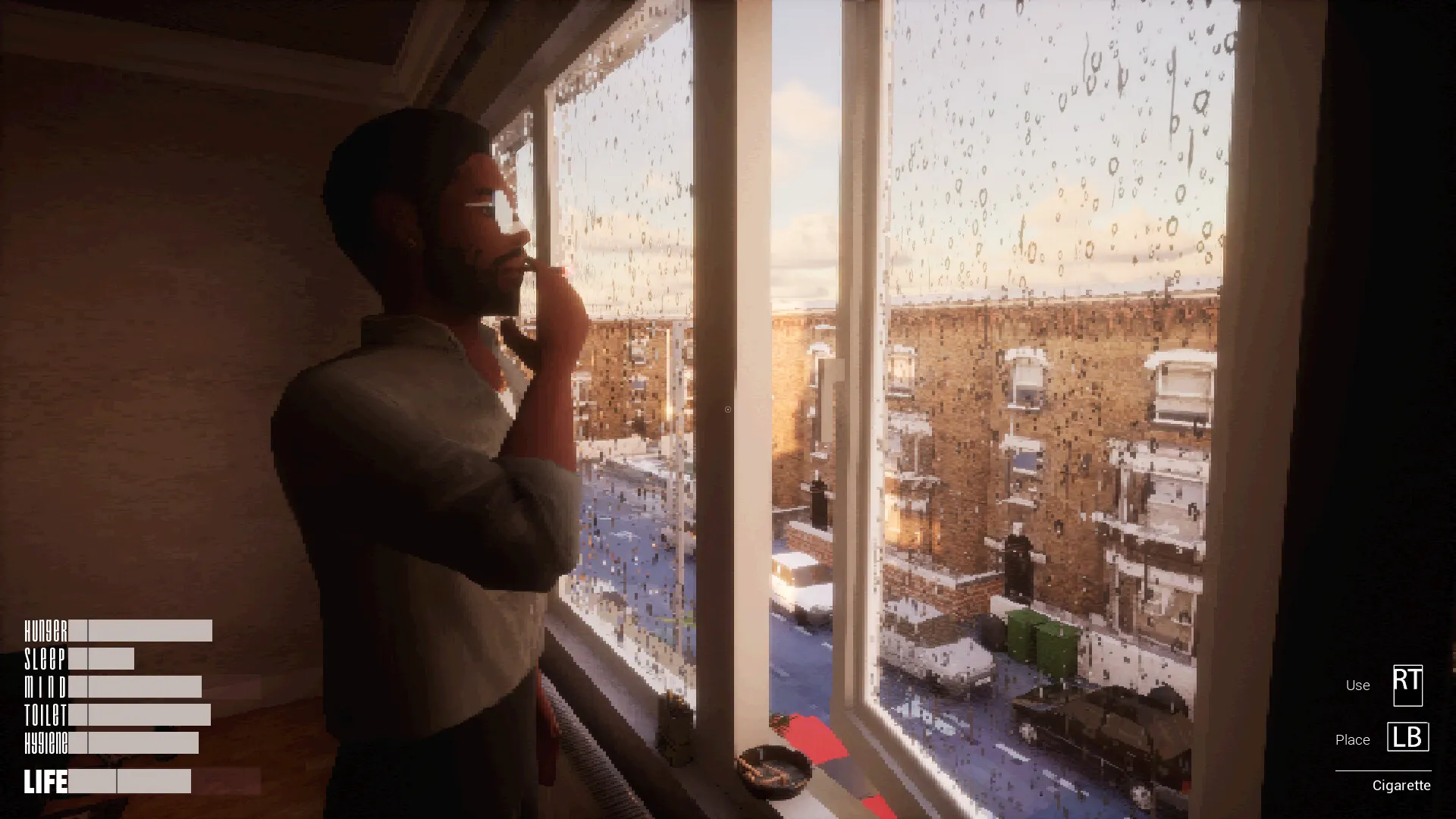Apartment Story whisks us away into the confined world of one man’s home, where threats lurk outside yet daily life demands attention within. As Arthur, we wake to fill the hours in our cramped abode, keeping body and mind in working order while an unfolding mystery tugs at the edges of our solitude.
A former roommate Diane disrupts the routine, embroiled in dangers yet reluctant to fully share her burden. So we do our best to support her through the simple acts of companionship, finding meaning where we can amidst the uncertainty. Meanwhile, more ominous signs emerge that someone may wish us or Diane harm, sharpening the intrigue.
Through it all, we’re left enveloped in the intimate familiarity of this space we know so well yet rendered unfamiliar by the shifts in circumstance. Windows that once offered distraction now seem like portals for threats to breach our perceived sanctuary.
Shadows that furniture usually cast now seem prone to concealing what none would wish to see. Each creak and groan takes on new life as heralds of some impending fate. The apartment itself forms the whole boundless world as we’re locked inside its walls, left to its devices, yet also granted liberation through imagination to roam where feet cannot while maintaining the necessary rhythms of life within its borders.
So in these close quarters the minutes somehow lengthen, every action swelling in importance as a means to pass the time, preserve well-being, or pursue clues towards resolution.
Our role is witness to unfolding revelations yet also participant shaping destiny through diligence to routine and choices granted however small their impact may seem. This is the setting Apartment Story presents, confining yet contemplative, where intrigue meets intimate familiarity and handcrafted drama emerges from life’s small dramas.
Weaving an Intimate Drama
Locked away in his cramped home, Arthur finds himself swept up in affairs much larger than the walls enclosing him. Former roommate Diane appears seeking aid, though hesitant to reveal the dangers stalking her trail. Soon Arthur learns of Blondey, Diane’s obsessive and threatening ex, whose interest in pursuing her has pulled the lonely man into perilous waters against his will.
Within this small space, an intricate interplay of relationships emerges yet remains only skin-deep. Arthur and Diane grow closer in facing the threat bearing down, yet their bond feels superficial. While Diane proves the spark igniting mystery’s flame, her vague responses leave longing for deeper understanding. Blondey menaces in his madness, though glimpses into his psyche leave wanting. All characters stay static, changing in status alone.
Players inhabit Arthur, yet granted scarce choice to shape proceedings. Narrative momentum rolls on predetermined rails regardless of steps taken or neglected. Conversation options stand stilted and consequence-void, leaving protagonists and players spectators to unfolding scenes rather than collaborators in crafting them. Despite various paths the story may traverse, it feels rigidly bound to a single inevitable endpoint.
Apace the thriller builds to its climax, yet payoff arrives perfunctorily without dramatic weight. Blondey bursts into the home for swift confrontation, then exits stage left as abruptly as he terrorized. Threads woven throughout receive cut without care, resolution unsatisfying as the rushed scenes preceding it. Where opportunities existed to intricately entwine character fates, storytelling stayed comfortably on the surface, never drilling down to emotive depths possible within the potent premise.
Potential existed for this confined setting to cultivate profound drama through intimacy. Instead, the narrative spreads itself thin, never penetrating beyond a superficial storyline’s skin to reveal the richness within both characters and the story’s scope. Constricted not by walls but by undemanding ambitions, the drama constructed within stays striking for its wasted potential to burrow into the complexities of human nature under pressure.
Keeping Body and Home
Arthur’s abode provides sustenance on multiple fronts. Life’s basic needs must be met through cooking warm meals, catching some z’s, and paying off utility bills. Visual gauges convey hunger’s growl or fatigue’s heavy lids, demanding attention lest health decline. Simple actions like sandwiches or shut-eye suffice at first.
Yet complexities emerge. Dishes pile and dust gathers unnoticed, characters blind to any change wrought. Bare cupboards leave Arthur peckish with no comment. Bills left unpaid cause no visible trouble. Mechanics meant to weave organic routines into gameplay lose function for lacking consequence.
More concerning, glitches undermine immersion. Floating trash taints the scene while fixing damage brings no praise. An elusive sandwich vanishes beyond reach, hunger unresolved. Such flaws disrupt gaming flow and limit experimenting joy.
Regardless of diligence, danger still finds its way inside. When intrusion comes, cleanup brings neither a closer companion nor a closer clue. Systems meant to draw us deep within daily drama drift toward superficiality. Potential remains to infuse routine chores with narrative weight, blurring reality with reimagining.
Apartment Story provides building blocks for an engrossing experience. Yet crafted connections prove thin, distancing players from felt realities. Mechanics conceptualized well-failed execution, stopping potential deeper substance dead in its tracks. With polish and purposeful intertwining, such foundations could uplift any story to rich immersion.
Transporting Players to a Living Space
Apartment Story envelops players in an intimate setting yet achieves contrasting effects with its presentation. Detailed clutter and furnishings crafted from pixels evoke coziness, inviting exploration to uncover personality within spaces. Light and shadow shift with day and night, tones warm by lamplight dimming chill by shadow’s depths.
Graphics garner appreciation less for precision than appreciation. Chunky models retain clarity amid low resolution, nostalgic in appeal yet purposeful in sparing processors. Players focus outward from tech limitations inward to story. Simple audio aids solitude, tracks offering moments to forget constraints and feel present.
Cracks appear, breaking flow. Items float, glitches abound, yanking back to realize as code, not credible world. Might suspension of disbelief survive such fumbles? Could polish strengthen atmosphere by reducing reminders hardware defines reality? Narrative invites comparing to genre greats, yet texture fails matching fine-tuned finesse fashioning fully formed fantasy.
Potential exists for audiovisuals advancing the intimate drama. Gleaning personality from possessions strewn recalls classics cultivating character through setting. Yet slack construction leaves milieu half-mirrored—envisioned yet unevenly executed. Tinkering might wed worlds seamlessly, transporting players past pixels to live as though within. Storytelling embraces imagination; here room remains for spiriting spirit further from fabrication’s flaws into fiction’s embrace.
Crafting Suspense in a Confined Space
Apartment Story sets an ambitious goal—generating thrills entirely within four walls. Alas, its cramped stage proves too constricting, preventing tension’s rise and denying climaxes their due intensity.
Promising setups fall short through haste. Threats establish yet stay skin-deep, leaving us detached observers. The showdown arrives too abrupt with no dramatic crescendo, resolving as spontaneously as it erupts. Complexities might have flourished given anchoring in character; instead, a rushed hand waves away peril with nary a second thought.
Gameplay pacing fares no better, mechanics monotonous, and consequences bare. Time trickles by yet never flows in torrents to match a thrill ride’s pulse. Repetitive tasks distance us from stakes apparently negligible to characters unaffected by player productivity. Story strides ahead while we lag idle, disconnected from drama by a lack of kinship with on-screen lives.
Potential lingers to craft confinement an asset rather than LIABILITY. Tension thrives under pressure, and what setting suffocates a narrative more than an apartment’s claustrophobia? Yet imagination remained untapped, scenarios unexplored, missing chances to transform boredom into dread through resourcefulness under lockdown. With refinement, pacing and payoffs might align, gripping us long after credits conclude their too-abrupt termination of thrills barely initiated.
Apartment Story holds rich soil for cultivation, an intimate thriller. But until tensions take root and climaxes are permitted to blossom, this confined stage remains too cramped to cultivate suspense to its harrowing heights. With nurturing, its intimate infrastructure could uplift any story to bind us in rapt complication; for now it continues too barren to bear dramatic fruits in the fullness they deserve.
Room for Improvement and Inspiration
Apartment Story shows hints of greatness amongst its flaws. Recall games like Gone Home or What Remains of Edith Finch—how setting drew players deep within dramatic worlds through intimate glimpses of others’ lives? Apartment Story strives for this yet falls short, with protagonist and location never feeling fully formed.
Compare to thrillers like Detention or life-sims Stardew Valley—here mechanics blended seamlessly into natural routines, deepening connection to place and purpose therein. Apartment Story’s tasks stay surface-level, disconnecting players from stakes. Where Resident Evil cultivated palpable peril through an atmospheric aesthetic, Apartment Story’s clunky visuals undermine rather than enthrall.
Its premise holds promise for conveying solitude’s shadows through isolation within an everyday cage. Yet moments slacken pacing, and inconsistencies between the story’s significance and the system’s superficiality rupture flow. Narrative flightiness and mechanical monotony leave tension and satisfaction unrealized.
Genres like Until Dawn showcase how even B-movie plots thrill when mechanics meaningfully intertwine. Where Stanley Parable blessed basic interactions with delightful purpose, Apartment Story’s feel perfunctory rather than playful.
None say it cannot succeed, but peers prove a tighter marriage of mechanics and narrative elevates even elementary executions. Apartment Story teases brilliance in the basics yet remains half-formed, inspiration evident yet execution faltering. With attunement to the strengths of those leading the way, its simple foundations could yet cultivate profound drama from life’s littlest depths.
Potentials exist to nurture here a gem worth many replays, but for now it demonstrates room for growing into its promise rather than fully realizing visions glimpsed within an unpolished yet intriguing starting point. With Nurturance, this confined stage may yet have theater complexities that continue to captivate long after the final curtain falls.
Stepping Outside the Box
In Apartment Story, confined spaces hold unbounded potential for crafted drama. Yet limitations in execution prevent pleasures promised by its intimate premise. Mechanics mean to immerse instead detach due to lack of purpose. Characters written to intrigue remain shallow, failing to develop beyond surface depictions. Storytelling aspires to thrill but settles for a passionless stroll rather than suspenseful surprises.
Technical troubles compound disconnections between gameplay and purpose. Glitches disrupt rather than enhance. Pacing drags where tension should tauten. Payoffs lack punch through hurried resolutions of threads barely spun. While the atmosphere arouses through authentic details, it remains undermined by a narrative never allowing full manifestation.
For all its unfulfilled ambitions, however, Apartment Story shows flashes of ingenuity in marrying genres typically distant. With polish transforming vision into vivid reality, this confined stage could yet cultivate mysteries the way confinement magnifies them in everyday life. As an experiment, it exposes promising avenues left sadly unexplored. Yet as a complete experience, it provides motivation to aim development at heights briefly glimpsed but ultimately out of reach.
Apartment Story leaves me hopeful for refinements learned from missteps, though its current state appeals mainly to those intrigued by creative risks regardless of roughness in execution. With dedication to excellence matching ambitious foundations, this confined drama holds potential for penetrating stories to touch all keen for thrillers seizing ordinary settings to extraordinary ends. For now, its potential exceeds achievements.
The Review
Apartment Story
Apartment Story is an imperfect yet promising thriller experiment, displaying flashes of creativity that outweigh its flaws. With further development honing its narrative focus and mechanically fleshing out systems, this confined setting could cultivate profoundly intimate drama. For now, the experience remains unsatisfying despite glimpses of what could be.
PROS
- Intriguing blending of genres in a life-sim thriller
- Authentic environmental details of a lived-in space
- Glimpses of potential for crafting drama through confinement
CONS
- Shallow characters that never develop meaningfully
- Lack of choices and consequences lessens player agency
- Slow, unexciting pacing fails to generate tension.
- Glitches disrupt rather than enhance the experience.
- Mechanics feel detached from narrative purpose.
- Short runtime not used to its fullest potential
